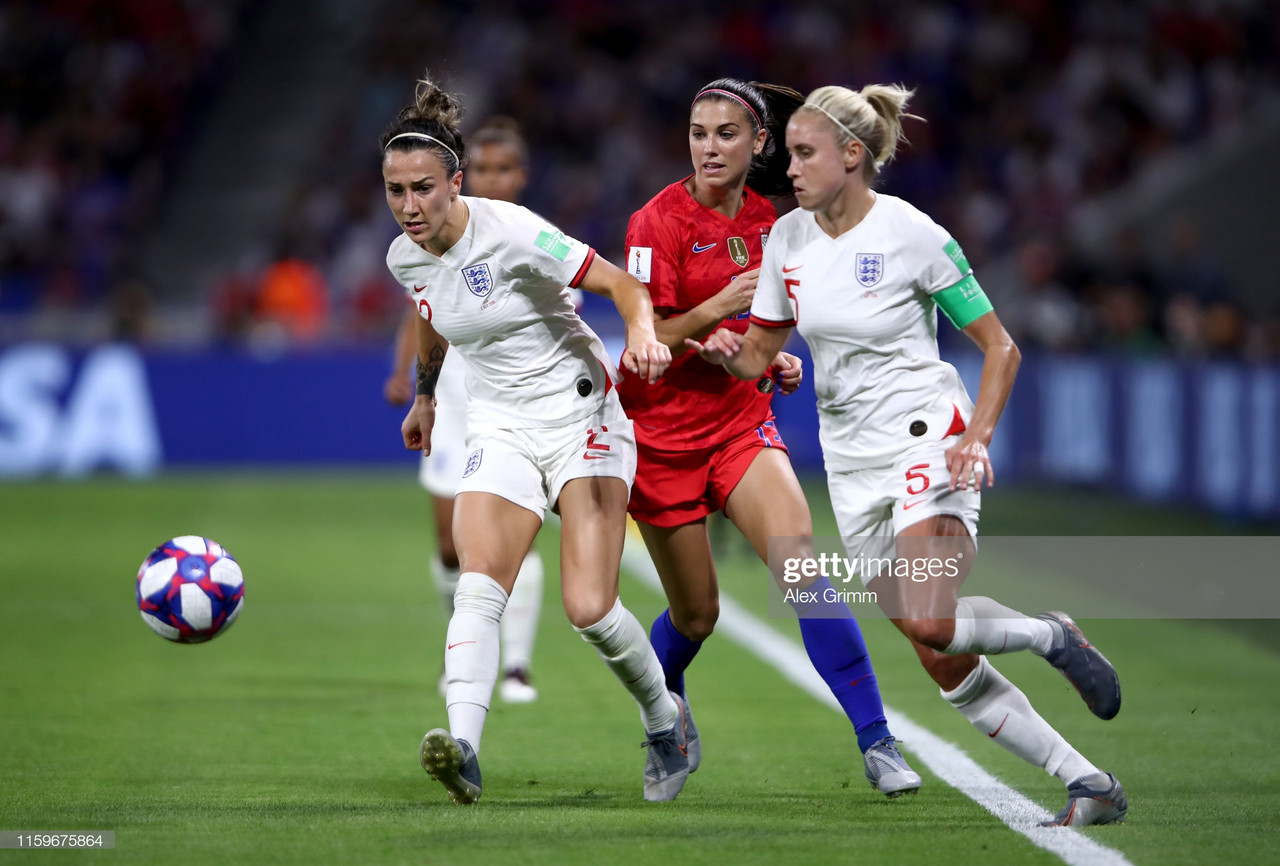This Saturday, the English national side travel north to midfielder Jordan Nobbs’ birthplace of Middlesborough to take on strong opposition in Brazil at the Riverside Stadium. At the time of writing, 30,000 tickets have been shifted for the sellout match, with 75,000 snapped up for the next game at Wembley against Germany in September. The game has grown in popularity over time, especially after the World Cup, but despite the region providing so much talent to their national team, it is not represented with a top-flight side, or a WSL level academy.
Lionesses dominance
When the Lionesses lined up for their World Cup Semi-final against the United States in July of this year, five of the side came from the north-east, with Lucy Bronze being born only three miles from the Scottish border in Berwick-upon-tweed. Demi Stokes, Jill Scott, Carly Telford, and captain Steph Houghton were all born in the region, and midfielder Jordan Nobbs would have also been in the side if not for an injury to her ACL. Whitby born Beth Mead also came through the ranks of Sunderland.
The demographics of the squad have changed drastically over time, and with the retirement of Karen Carney, the West Midlands have nobody representing them on the national side, despite Birmingham City and Aston Villa being prominent sides in the women’s game. The team is mostly represented by people who were born in the north of the country, whilst Leah Williamson, Ellen White, and Fran Kirby the only players in Phil Neville’s squad who were born below Nottingham (excluding Karen Bardsley, who is from California in the USA, but with family links to Stockport)
Sunderland’s role
Most of those players from the north-east of England all descend from the academy of Sunderland Ladies, a side who have been seemingly unrivalled at nurturing young English talent. However, in 2018 and with the looming reformation of Women’s Football leagues into a new structure containing a fully professional WSL, the Mackems’ applications for the top flight and the FA Women's Championship were rejected after the men’s side pulled funding, with them now applying their trade in the third tier of the game - the FA Women's National League North. In their current division, they sit top, and unbeaten, after only six matches.
When their application was rejected in May of 2018, ex-Mackem Lucy Bronze made her views clear on the situation on Twitter. In her early footballing life, her parents used to drive her 60 miles each way to Sunderland to be a member of their girls' team, when she was told that because she was a girl she was not allowed to play with her local club. She said:
“I understand that dream has just got a lot harder for the girls and parents in the northeast... but don’t stop, you are just going to have to work a little harder than everyone else, to get where you want to be...
“But trust me, 15 years later when you have a Champions League medal around your neck, you’ll look back and thank them for giving you the fight you needed to succeed.”
I understand that dream has just got a lot harder for the girls and parents in the north east... but don’t stop, you are just going to have to work a little harder than everyone else, to get where you want to be 💪🏼
— Lucy Bronze (@LucyBronze) May 28, 2018
Sunderland fan, writer for Roker Report, and podcast host Graham Falk (@GF_RokerReport) spoke to VAVEL UK about the club:
How much do you think the club was damaged by not being given a license for WSL football?
That was a really tough for the Lasses, absolutely. To be demoted is bad enough, but the reasons for it were just so unfair. Melanie also lost almost a full squad baring Keira Ramshaw and had to rebuild a team almost overnight.
You have to commend how well they did last season though. They came second only due to some abnormally good form from Blackburn. If that doesn't show you the character we have in the team, I'm not sure what does.
Heartbreaking it may have been, but I think as a group, they should be immensely proud of their response.
Has the club progressed since the start of the 2018/19 season?
Definitely. Since the demolition they've done nothing but continue to respond and improve.
Melanie Reay is a really high level coach and excellent motivator and the main reason for the Lasses continual improvement. She pushes them to keep getting better and not rest on their laurels.
We've had a phenomenal start to the season, but their feet are firmly on the ground and focused on winning the league. Mel's an ideal manager for that mindset.
Do you think that the club could secure a FAWC place under Melanie Copeland?
Absolutely. 100%.
She's worked with England and is one of the best coaches around. I'd love to expand on that, but I'd be repeating myself. You can see my thoughts on Mel for all the reasons I detailed earlier.
The Lasses have a top-level coach and a great motivator in charge.
Looking back only as far as 2017, the club had the likes of Lucy Stanforth playing for them, are they still producing promising young talent?
You bet! The conveyor belt of talent that comes out of SAFC Ladies is on another level.
You mentioned Lucy Staniforth, but Jill Scott, Steph Houghton, Lucy Bronze, Jordan Nobbs, Beth Mead - all former SAFC players.
There's two extremely exciting talents at the club at the moment. Firstly there's winger Jess Brown, who is only 16, that is getting people off their seat. She scored goal of the month in our cup win over Newcastle and has been free-scoring for the team. I can't believe she's only 16, because she is mature behind her years. Shes played for England youth quite a bit and, based on this season's evidence so far, she'll continue on her upward trajectory.
Behind her is another Lass that played for England youth and is still only 16 herself, Neve Herron.
She's very much a modern-day full-back and supports her winger really well. She's really fast, can put a great ball in and gets stuck right in too. I haven't seen an opposition winger get the better off her yet.
Outside of the two young uns, you've got Keira who has played at a much higher level, Bridget Galloway scores almost every week and Mollie Lambert is a great box to box midfielder, who can really dictate the tempo of the match. All of them are still really young too; they'll only get better.
The side picked up three points at Nottingham Forest last Sunday and are still unbeaten, do you think that they can continue that form?
Definitely.
Melanie and the team know they have the abilities as a unit to win the league, and win it at a canter.
They've been clinical at times, beating Hull 9-1 and promotion rivals Huddersfield 4-1, but they've also shown some real character and spirit, coming from behind to win games on more than one occasion.
There's also a good squad there that keeps up competition for places, or enables us to handle any kind of injury crisis. Whilst Bridget Galloway is a goal machine, if she isn't on form, she knows there's another option like Abi Cottam on the bench.
Sunderland have produced so many good players in the past, why do you think this is?
At risk of sounding cliched, the northeast is a hotbed of football right across the region. The love of football is engrained in Sunderland.
Whilst many parents across the UK complain kids are getting out and playing enough, there's still plenty of boys and girls kicking a ball about in the street here - and SAFC have some great things in place to help them express that.
We have a great academy and the Foundation of Light that doesn't just nurture that talent, but it also engages people from around the region, aspiring footballers included, of course.
Sunderland does so much good work in the community, and it really deserves to be highlighted more. There are some fantastic people at SAFC and they are bringing so much to the region. I doff my non-existent cap, I really do.
Durham’s rise
The Wildcats currently sit top in the country’s second division, the FA Women’s Championship with a 100% record, netting 15 goals in their first four league matches and beating joint-first Aston Villa in the Continental Cup.
The club was founded in 2014 as a collaboration between South Durham & Cestria Girls and Durham University. When the professional FA WSL was created, the side found themselves placed in the new ‘FA Women’s Championship’, in which they finished fourth in the 2018/19 season, whilst they soared to the quarter-final of the FA Cup.
The club’s manager, Lee Sanders, found himself drawn to the world of women’s football somewhat accidentally unlike many others in the game. After his then five-year-old daughter enjoyed playing, he set up a team for her to participate in. His daughter played for fun, but Sanders found himself taking it more and more seriously. The club has a very close relationship with the city’s prestigious University, and he spoke to The Guardian about this:
“Our model’s completely different,” he says, explaining that, unusually, the team are not attached to a men’s club. “But it works. We’re incredibly well supported by Team Durham [the university’s multi-sports performance programme]; we’ve got access to every facility we could want.
“We’ve got a fantastic scholarship scheme, which combines playing with studying part-time for a Durham master’s degree,” says Sanders. “Sometimes there’s a bit of a misconception that we’re the poor relation but we’ve got a lot going for us.”
Lack of Euro 2021 representation
Despite all of this, many were displeased to find that the region will not host any football at the upcoming 2021 European Championships in England. The region has not seen national team football in a long time, being neglected by the men’s side - but the sellout of the Riverside for this weekend’s tie is surely a big sign.
Four of the stadia will be in the north of the country, with games being played in Manchester, Leigh, Sheffield and Rotherham - but five will be played in the south, the opposite to the demographical makeup of the squad representing England. Of course, many of the bigger games will be played at Wembley Stadium, but both Brighton and Hove and Southampton on the south coast will see the tournament’s matches played. The last time that a major international tournament was hosted on English soil, the 2005 European Championships, 29,092 people flocked out to the Etihad Stadium to watch the Lionesses take on Finland, and a repeat of those numbers is to be expected in two years’ time.









































